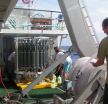(Press-News.org) Scientists today agree that there are five molecules that are known to affect or cause Alzheimer's disease, which plagues an estimated five million Americans. The potency of these molecules is linked to environmental factors such as diet and lifestyle.
Prof. Daniel Michaelson of Tel Aviv University's Department of Neurobiology at the George S. Wise Faculty of Life Sciences has illuminating news about one of these five molecules — APOE, created by the apolipoprotein E. gene found in all of our bodies.
Prof. Michaelson says APOE comes in two forms, a "good" APOE gene and a "bad" APOE gene, called APOE4. He has developed animal models to investigate the effects of diet and environment on carriers of APOE4, the presence of which is a known risk factor for Alzheimer's. It appears in 50% of all Alzheimer's patients, and in 15% of the general population which due to APOE4 is the population which is at risk of getting the disease.
The good news? In preliminary results, the researchers are exhilarated to find that a diet high in Omega 3 oils and low in cholesterol appears to significantly reduce the negative effects of the APOE4 gene in mouse models.
Exercise is not enough — and may be worse
In differentiating between the good and bad variants of the APOE gene, Prof. Michaelson and his team studied many variables. They determined that while a rich and stimulating environment is good for carriers of "good" APOE, the same environment has a negative effect on those at risk for Alzheimer's because they carry the APOE4 gene. While this environment stimulated the formation of new neuronal connections in the "good APOE" mice, it caused the death of brain neurons in the "bad APOE" mice. The stimulating environment included running wheels and tubes for hiding and sliding, as well as ropes and other toys for the mice to play on, replaced and updated with new toys weekly. Those in a non-stimulating environment had access to no toys at all.
"Conditions that are generally considered good can be harmful if the mouse is a carrier of the APOE4 gene. Extrapolating this to the human population, individuals with the bad APOE4 gene are more susceptible to stress caused by an environment that stimulates their brain," says Prof. Michaelson.
Recently he expanded his original findings, first published in the Journal of Neuroscience in 2008,
with a new element: diet.
APOE is a lipoprotein and known to be influenced by the good oil found in fish. Prof. Michaelson and his European colleagues, under a joint European Commission grant called LIPIDIDIET, constructed an experiment. In a standardized environment, they introduced three different kinds of diet: a normal diet, a "bad" diet high in cholesterol, and a "good" diet high in fish oil.
When it's good, it's good
"The main take-away message here is that good diets can alleviate the effects of bad genes. Of course nutritionists have had this general idea for a while, but it's nice to be able to show that this approach can be applied to specifically counteract the negative effects of Alzheimer's disease-related genes," says Prof. Michaelson.
The results with more details will be presented at an international conference in Barcelona, Spain this March.
INFORMATION:
The Joseph and Inez Eichenbaum Foundation of Beverly Hills has been supporting Prof. Michaelson's Alzheimer's research continuously and generously over the last 15 years.
American Friends of Tel Aviv University (www.aftau.org) supports Israel's leading, most comprehensive and most sought-after center of higher learning. Independently ranked 94th among the world's top universities for the impact of its research, TAU's innovations and discoveries are cited more often by the global scientific community than all but 10 other universities.
Internationally recognized for the scope and groundbreaking nature of its research and scholarship, Tel Aviv University consistently produces work with profound implications for the future.
Good diets fight bad Alzheimer's genes
Tel Aviv University says diets high in fish oil have a beneficial effect in patients at risk
2011-02-16
ELSE PRESS RELEASES FROM THIS DATE:
How do women fend off domestic violence?
2011-02-16
This release is available in French.
Montreal, February 15, 2011 — For many women in violent relationships, leaving is not an option. Yet a woman's arsenal of defenses for resisting violence critically depends on her position within the family and community, according to new research from Concordia University published in the journal Review of Radical Political Economics.
"Women's resistance is often conceptualized only as exit, which is problematic," says study author Stephanie Paterson, a professor in the Concordia University Department of Political Science and ...
Using chlorhexidine gluconate baths to reduce hospital-acquired infections
2011-02-16
CHG cloths more effective in reducing risk for acquiring HAIs
Study shows 64 percent decreased risk of infection from MRSA or VRE
May be beneficial for both ICU and general medical unit patients
PROVIDENCE, R.I. – A new study from Rhode Island Hospital has found a reduced risk of hospital-acquired infections (HAI) when using two percent chlorhexidine gluconate (CHG) cloths for daily bathing instead of soap and water. The study found a 64 percent decrease in the risk of acquiring an infection from either methicillin-resistant Staphylococcus aureus (MRSA) or Vancomycin-resistant ...
'Healthy' patients at high risk of cardiac death identified
2011-02-16
The way the heart responds to an early beat is predictive of cardiac death, especially for people with no conventional markers of cardiovascular disease, according to new research from Washington University School of Medicine in St. Louis.
The conventional risk factors, such as high cholesterol, smoking, diabetes and high blood pressure, account for many but not all deaths from cardiovascular causes. As a result, doctors are always searching for better ways to identify patients at risk of cardiac death.
The new research indicates that an abnormal response to an early ...
UF leads world in reconfigurable supercomputing
2011-02-16
GAINESVILLE, Fla. — University of Florida researchers say their supercomputer, named Novo-G, is the world's fastest reconfigurable supercomputer and is able to perform some important science applications faster than the Chinese supercomputer touted as the world's most powerful.
In November, the TOP500 list of the world's most powerful supercomputers, for the first time ever, named the Chinese Tianhe-1A system at the National Computer Center in Tainjin, China as No. 1.
In his state of the union speech, President Barack Obama noted, "Just recently, China became home ...
EARTH: Oil and water help US win World War II
2011-02-16
Alexandria, VA – The U.S. had two key strategic advantages over the Axis in World War II: oil and water. Although other factors played major roles in the U.S. and its allies winning the war, these two natural resources played a much larger role than recognized.
World War II was the first highly mechanized war. In the March feature "How Oil and Water Helped the U.S. Win World War II," EARTH magazine explores how the abundance of domestic US oil and water in the South and Pacific Northwest drove not only tanks and planes, but also industrial production and technological ...
Study compares balanced propofol sedation with conventional sedation for therapeutic GI endoscopic procedures
2011-02-16
OAK BROOK, Ill. – Feb. 15, 2011 – Researchers from Korea report that, compared with conventional sedation, balanced propofol sedation (BPS) using propofol in combination with midazolam and meperidine, provided higher health care provider satisfaction, better patient cooperation, and similar adverse event profiles in patients undergoing therapeutic endoscopic procedures. This is the first prospective study of BPS in direct comparison with conventional sedation. The researchers note that this study provides further evidence to support the adoption of endoscopist-directed ...
FASEB praises President Obama for increasing funding for research in his FY 2012 budget
2011-02-16
Bethesda, MD - William T. Talman, MD, President of the Federation of American Societies for Experimental Biology (FASEB), praised President Barack Obama for his continuing support for science and engineering. "The President recognizes that our future depends on research," Talman stated. In a letter to President Obama, Talman noted that his "support for this critical investment—even during a time of unprecedented budgetary constraints—will help to improve the lives of millions of people."
In his FY 2012 Budget, President Obama proposed a $745 million increase over the ...
A device enables the remote explosion of improvised land-mines
2011-02-16
Composed of diverse elements, mostly of plastic, with little metal used, improvised explosive devices are very difficult to detect. In cooperation with two colombian universities, scientists at EPFL's Electromagnetic Compatibility Laboratory have found a solution. They have developed a device enabling the remote explosion of these mines, by using the energy from their electromagnetic impulses.
This type of mine is often used by guerillas or terrorist groups in conflict zones, and is present in many regions of the world, such as Colombia, Iraq and Afghanistan. They kill ...
University of Miami scientists find new way to estimate global rainfall and track ocean pollution
2011-02-16
MIAMI – Feb 15, 2011 – A study by scientists at the University of Miami (UM) Rosenstiel School of Marine & Atmospheric Science suggests a new way to estimate how much of the ocean's pollution is falling from the sky. The new findings can help improve scientific understanding of how toxic airborne chemicals, from the burning of fossil fuels and industrial power plants emissions, are impacting the oceans globally.
By measuring Beryllium-7 (7Be) isotope concentrations in the ocean, which is found naturally throughout Earth's atmosphere, Rosenstiel School scientists David ...
Government mashups -- better contact with public authorities
2011-02-16
Potholes in the road or a park bench in need of repair – we all come across these or similar problems every now and then. If only there were a simple way of reporting them to the right department of the public administration! The latest mashup technology and mobile applications make it possible to come up with solutions.
Inspired by the UK website www.fixmystreet.com, the Fraunhofer Institute for Open Communication Systems FOKUS in Berlin is taking this approach further. Damage reports can be assigned GPS coordinates by cell phone and entered. The system then provides ...
LAST 30 PRESS RELEASES:
Scientists develop new gut health measure that tracks disease
Rice gene discovery could cut fertiliser use while protecting yields
Jumping ‘DNA parasites’ linked to early stages of tumour formation
Ultra-sensitive CAR T cells provide potential strategy to treat solid tumors
Early Neanderthal-Human interbreeding was strongly sex biased
North American bird declines are widespread and accelerating in agricultural hotspots
Researchers recommend strategies for improved genetic privacy legislation
How birds achieve sweet success
More sensitive cell therapy may be a HIT against solid cancers
Scientists map how aging reshapes cells across the entire mammalian body
Hotspots of accelerated bird decline linked to agricultural activity
How ancient attraction shaped the human genome
NJIT faculty named Senior Members of the National Academy of Inventors
App aids substance use recovery in vulnerable populations
College students nationwide received lifesaving education on sudden cardiac death
Oak Ridge National Laboratory launches the Next-Generation Data Centers Institute
Improved short-term sea level change predictions with better AI training
UAlbany researchers develop new laser technique to test mRNA-based therapeutics
New water-treatment system removes nitrogen, phosphorus from farm tile drainage
Major Canadian study finds strong link between cannabis, anxiety and depression
New discovery of younger Ediacaran biota
Lymphovenous bypass: Potential surgical treatment for Alzheimer's disease?
When safety starts with a text message
CSIC develops an antibody that protects immune system cells in vitro from a dangerous hospital-acquired bacterium
New study challenges assumptions behind Africa’s Green Revolution efforts and calls for farmer-centered development models
Immune cells link lactation to long-lasting health
Evolution: Ancient mosquitoes developed a taste for early hominins
Pickleball players’ reported use of protective eyewear
Changes in organ donation after circulatory death in the US
Fertility preservation in people with cancer
[Press-News.org] Good diets fight bad Alzheimer's genesTel Aviv University says diets high in fish oil have a beneficial effect in patients at risk




